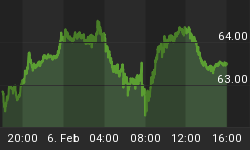Based on the March 2014 Market Overview report.
Can the gold price be fundamentally related to some other economic variables? Can we use those variables successfully in trying to predict the future price of gold? Is gold highly correlated with any of those variables?
Last year a very insightful and interesting working paper was published in the webpages of the National Bureau of Economic Research by Claude Erb and Campbell Harvey. The paper is mostly about gold being perceived as either a safe haven or an inflation hedge. After a while it sparked various discussions about gold not being what it is thought of. And rightly so. As we have already mentioned many times in the Market Overviews, gold is not historically an inflation hedge device which will protect you against possible inflation. Of course the special case for the gold price could be a hyperinflationary scenario.
In the same paper Erb and Harvey have found a very interesting correlation in the gold market that lies between the gold price and the interest rates. If real interest rates rise, then gold falls. If real interest rates fall, gold gains. In itself this relationship is nothing new for gold analysts. This observation about gold related to the interest rates has been floating around for some time. It is perfectly understandable since there are good explanations for the phenomenon, and (as opposed to the inflation-hedge hypothesis) this one actually has some confirmation in the data.
Erb and Harvey did a comparison of the real price of gold to TIPS - Treasury Inflation Protected Security - to ten-year government bonds, which are adjusted by the inflation rate. The correlation seems to be very high, especially in the realm of economic data - 0.82! This is pretty high if we compare it with numerous other correlations done in various fields of study.
It is no surprise then that the previously existing theory has been boosted again. Despite the fact that the authors of the paper were very careful and reserved in drawing any serious conclusions from this observation, some of those inspired by the research already attempted to use those observations to predict future gold movements. We could read predictions that if you expect gold to come closer to 2 thousand dollars per ounce, then we should see interest rates first coming lower under the one percent level. At least that's what the numbers are telling us, and the numbers could not possibly lie to us, could they? Perhaps I forgot to mention that all those predictions have something smuggled in a very smooth and elegant way, which comes down to "provided that history is good guidance..."
Is it in this case?

Actually an observed correlation relates only to the most recent 17 years. That is not that much when it comes to determining long-term relationships. And it can be explained in a different manner. As we emphasized, gold should be treated as a specific currency in the financial market. It is a dollar alternative. Therefore anything that happens to the dollar economy, any negative sign of its weakness will favor gold, and boost its value. Therein is the reason why low real interest rates were so often associated with gold's increases in value. When the American economy is weak, interest rates are often lowered because of the responsive monetary policy of the central bank. Hence there may have been a common denominator for low interest rates and high prices of gold: bad times for the dollar economy. With distrust in dollar assets, investors get more interest in the shiny asset, and bureaucrats are ready to print money. Those two things perfectly coincide.
Actually any sensible story about investing in gold could be translated into the comprehendible story within the margin.
How is that relevant for the current gold investor? As simple as this: even if the interest rates are raised, it does not mean that gold's bull market has to be over. Even if the returns on government bonds go up significantly, the gold market need not be decimated because of it. And the other way around. Just because interest rates are at low levels and will stay at significantly low levels (as Yellen tries to assure us), it does not mean that gold is the safest investment on a short-term basis (as recent experience in the market a few months ago has confirmed). Every such change has to be interpreted in the context of the economic situation. We also have to remember that interest rates are a very complex phenomenon.
It is not hard to imagine a scenario in which long-term interest rates are going up, and gold is still booming. In fact it is quite easy. Can there be the case of more distrust in the dollar system and increasing returns on government bonds? Yes, there can be such a scenario. For example, it can simply happen when investors also start distrusting US Treasuries, and not only other (mostly commercial) dollar assets (which could happen if inflation was very high, and in the end a huge outflow of capital from United States would result). Plus, in the previous bull market (70's), interest rates simply followed gold higher.
All in all, the main reason behind gold's bull market is the failing dollar system. The Fed's interest rate policy is a way to deal with this epic problem and gold's performance is mainly the consequence of the latter, not the former. It therefore seems that the interest rate environment will continue to support higher gold prices, but one should keep in mind that the gold-interest-rates link is not carved in stone.
Thank you.
The above is an excerpt from our latest Market Overview report. We invite you to sign up for the full version today.















